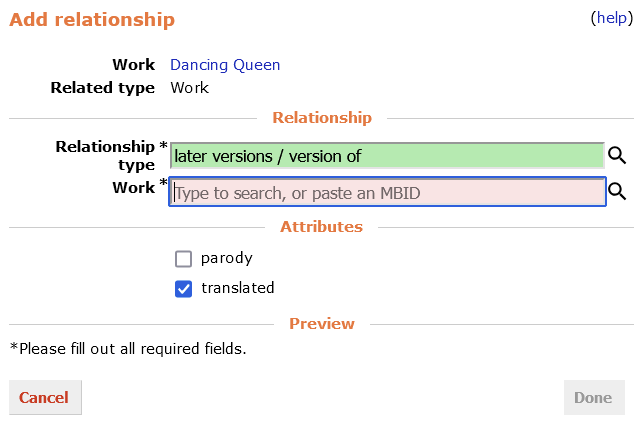Is there a good relationship between an original recording and a translated version where only the vocals are re-recorded?
Some examples:
- A typical Disney animated movie soundtrack has multiple translated releases where the instrumentation on all tracks is kept identical.
- Some artists record the same song in both English and Spanish.
It’s not an “Edit”, it does more than just “Sample” and “Remix” gives the wrong picture.
A reason for making some sort of relationship is to remove the need to sync instrumentalists, recording locations, producers etc. and only add additional personell.
For a Work there is the “Later version” and Release group has “Translated version” but what can/should be used for Recording?
pinging @zemeles, as they do a lot of work with Disney translations, and might have some input or insight
to me, remix makes sense in theory, but doesn’t make practical sense. I mean yes, changing out a vocal track seems similar enough to rerecording instruments for a remix, but it doesn’t really feel like a “remix” remix to me
it’s also certainly not an edit or a sample, perhaps a Partial rerecording relationship is in order? idk
I don’t know one per say for recording, but for works you can specify a work as translated:
And then link the translated recording to that work.
3 Likes
I’d say it’s a new mix, not a remix. I’d assume Disney being who they are, are mixing the different language from the start. I’d believe that before taking the English language recording and removing the vocals and adding new ones. Likely they are using the same mix of instruments and just adding the foreign language as a different mix. I think by having it linked to the work, we can easily find all the different language recordings. It’s the work that’s translated, not the recording itself. So, I think all the existing relationships cover this.
that’s probably a better approach in general
that said, if there’s an instrumental recording of the song, all the different language versions should probably be linked to that
Yes, finding the different versions of the Works is not an issue, that process is very straight forward.
The specific situation that made me wonder this was when I entered credits for a translated Disney song. Of course, I could just have copied all the technicians and musicians from the English recording but that would not reflect how the translated version came to be and (more important) any edits of the original version would not carry over automatically.
I sounds like the “remix” relationship could use som attributes just like “later version” has for Work.
I said the new vocals version in this specific example could be linked as a remix of the instrumental version, because you were specifically asking for a way to link the two in hip hop for example “remix” is sometimes used for songs with extra vocals, so it seems like the least bad option. I never said this is the right thing to use for every case of a translated song.
We don’t have inheritance so this isn’t useful anyway - all of those things should be added again if they apply (of course, some recording locations and engineers might not apply if they were just for the vocals, and there might be new ones for the new vocals).
3 Likes
There will be two sets of recording locations, engineers, producers etc. I think it is a good use for the “additional” attribute.
For me, linked credits would still be useful even without actual inheritance. But Musicbrainz is a lot of different things for a lot of different people so I understand if someone else doesn’t like it.
2 Likes
Thanks @UltimateRiff for tagging me in this and I’m so sorry for answering so late. I had been meaning to do it but I forgot. With that said, I think the current the way we treat translated recordings is good. Although a recording-recording relationship would make finding translations a little bit easier, I feel like it would be redundant. If a relationship were to be added, it should be one about the instrumentals being the same - something along the lines of “{recording 1] shares instrumental with [recording 2]”. This could be useful not only in the context of translated songs but also covers, since sometimes covering artists will use the original instrumental (at least on YouTube XD); I can also see use in cases where a song has originally been recorded multiple times by multiple artists (I know some Barbie songs that are like that). That way we wouldn’t have to care about the mixing situation or when each version was released.
1 Like
